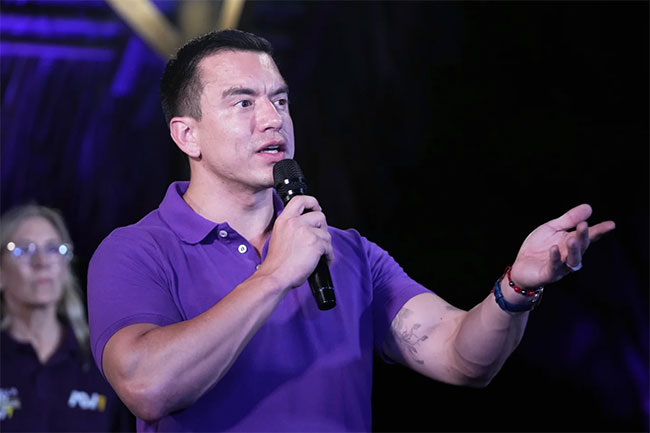Ecuador's Election: A Nation Divided Over Crime Policies
Ecuadorian politics are deeply polarized as Daniel Noboa secures reelection, promising stringent crime control amidst calls for recount and accusations of electoral fraud.
Published April 15, 2025 - 00:04am

Image recovered from adaderana.lk
The political landscape in Ecuador continues to be highly contentious following the reelection of Daniel Noboa, a millionaire and conservative with a tough approach towards crime. Winning the presidency with 55.8% of the vote, Noboa's governance has polarized the nation, especially given his controversial crime-fighting methods which some view as necessary, while others see them as testing the democratic boundaries of the country.
Following his surprising first victory in 2023, Noboa has made significant promises to curb the rampant crime driven by drug trafficking, a promise that resonates with many Ecuadorians living under the constant threat posed by local criminal syndicates tied to international cartels. His approach has included heavy militarization and the use of aggressive legal measures to tackle gang operations, which, despite criticisms from human rights organizations, have resulted in a reported drop in homicide rates.
However, his opponent, Luisa González, has refused to accept the election results, denouncing them as tarnished by grotesque fraud. Her campaign represents a section of the electorate nostalgic for the era of Rafael Correa, known for lower unemployment and straightforward social policies despite allegations of corruption and authoritarianism. González emphasizes restoring these aspects while claiming Noboa's administration has edged towards authoritarian rule under the guise of public safety.
The path to Noboa's reelection has not been smooth, marked by claims of fraud and electoral irregularities. Noboa himself aired concerns over irregularities post-election, though these claims were dismissed by international observers. This reflects a broader narrative of distrust and the push against corruption within Ecuadorian politics, a sentiment multiplied by allegations from González's supporters about premarked ballots and coercion.
Ecuador stands as a strategic battleground in the fight against the drug trade, given its geographical position between major cocaine-producing nations, Colombia and Peru. This has transformed Ecuador from a peaceful nation to one of the most violent in South America, presenting a major challenge for any administration. Noboa's tough stance aims to leverage international support, though this has been met with skepticism by leftist factions and human rights activists who worry about the erosion of civil liberties.
The political division is deepened by socioeconomic factors, with a significant portion of the population facing unemployment or underemployment amidst a struggling economy. These conditions are a fertile ground for crime and unrest, challenges that the newly-elected president has pledged to address through neoliberal economic policies and austerity measures, aiming for investment-driven growth.
Looking forward, Noboa's administration faces the daunting task of navigating these complex issues. With Luisa González's refusal to concede, holding the country's unity in a delicate balance will require substantial diplomatic skill and policy efficacy. Ecuadorians remain vigilant and hopeful for positive change, as they grapple with the ever-looming shadow of crime and political discord.





